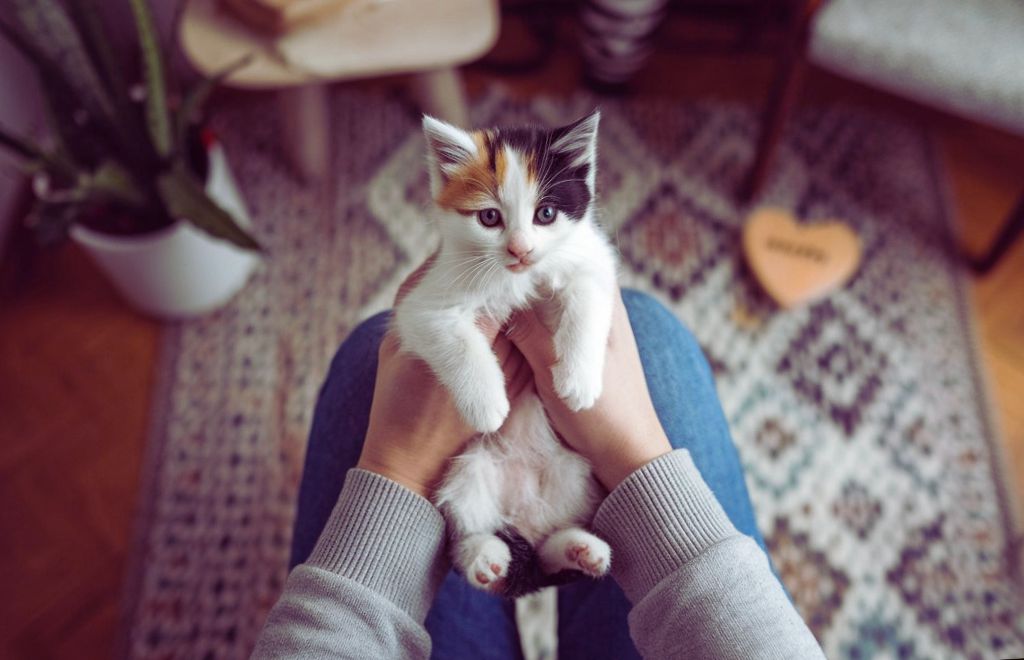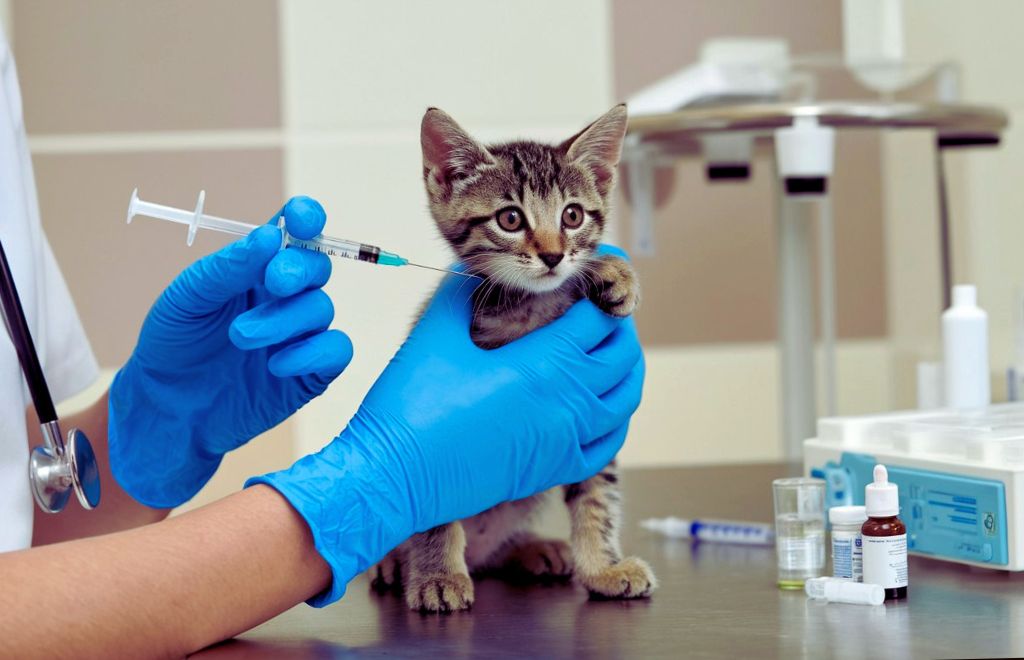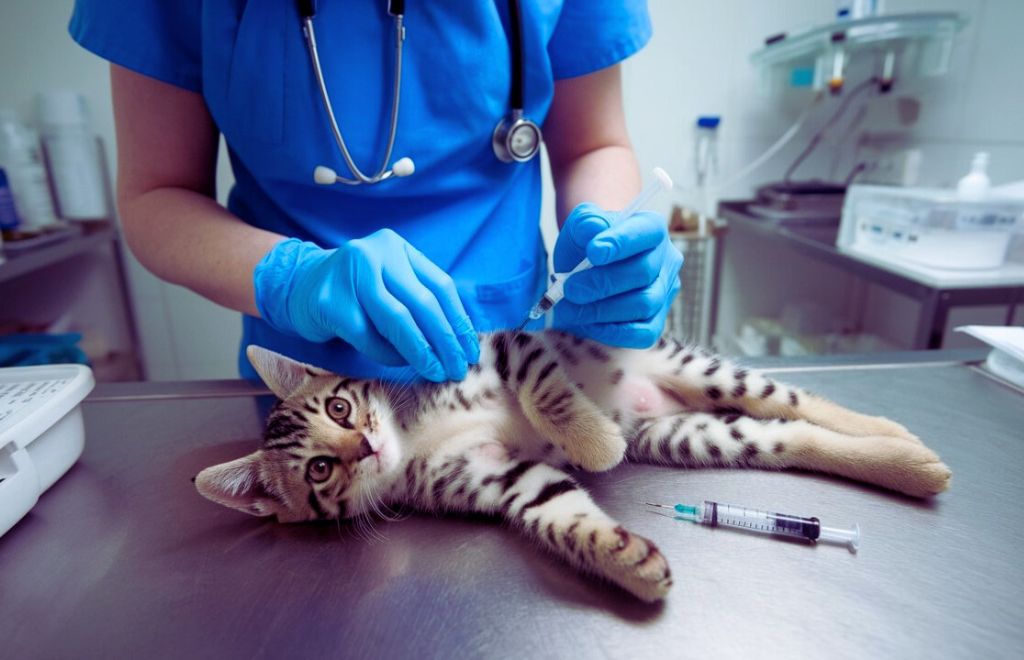Taking a new kitten home makes you happy and excited. It warms your heart. Those small paws, lighthearted antics, and soft purrs forge a lifetime of connection. But great responsibility follows wonderful cuddles! Following an indoor kitten vaccination schedule is one of the most crucial chores for new cat owners. This essential schedule guarantees your pet friend’s years of health and happiness.
Why is an indoor kitten vaccination schedule so crucial? Even if your little ball of fluff never sets a paw outside, they can still be at risk for several ailments. Some cunning bacteria can ride on your clothes or shoes, endangering your cat. By keeping to an appropriate indoor kitten vaccination schedule, you’re constructing a strong shield of protection around your new family member. It’s like giving your cat a superhero cape to battle unseen evil menues!
The indoor kitten vaccination schedule isn’t just about shots, though. It’s a journey of health and growth that you and your kitten take together. These doctor appointments provide the opportunity to ask questions, monitor your cat’s general health, and pick tips on how to be the best pet parent you can. Think of the indoor kitten vaccination schedule as a guide to a long, happy life with your feline friend. It’s an investment in purrs, playfulness, and numerous cuddles. So, let’s dive into the world of kitten health and discover the five steps of an indoor kitten vaccination schedule that will set your little one up for a terrific future!
Why Vaccinations Matter for Indoor Kittens
Vaccinations are essential even if your kitten never goes outside. This is the reason why:
1.Sneaky Germs:
• Viruses can travel with you in your clothes or shoes.
• Some bacteria have a long half-life on surfaces.
2. Escape Artists:
- Kittens are fast and inquisitive.
- They may sneak out through an open window or door.
3. Future-Proofing:
• One day, your indoor kitten might venture outside.
• It’s better to be safe than sorry
4. Visitor Safety:
• Humans can contract certain infections from cats.
• Vaccines ensure the safety of your visitors and family.
5. Legal Requirements:
• Numerous vaccinations, such as the rabies vaccine, are mandated by law.
• Even with indoor cats
6. Emergency Readiness:
• In the event of unforeseen circumstances or natural disasters
• Your cat may have to spend some time in a shelter.
Remember: vaccines are less dangerous than the illnesses they guard against. They’re an easy approach to maximize the chances of a long, healthy life for your indoor kitty!
Which Vaccines Are Required for a Kitten?
The immunizations a kitten normally need are broken down as follows:
Core Vaccines (Recommended for all kittens):
1.FVRCP Immunization:
– Guards against panleukopenia, calicivirus, and feline viral rhinotracheitis
Referred to as the “distemper shot”
– Inhaled in a sequence of doses, beginning at 8 to 9 weeks of age
2. Vaccine against Rabies:
Required by law in numerous locations
– Usually administered at 12–16 weeks of age as a single dosage.
Non-Core Vaccines (Advised according to Lifestyle):
3. The FeLV (Feline Leukemia Vaccine):
– Frequently advised for kittens, even if they will only be kept indoors
– Given in two doses, usually starting at 8-9 weeks old
4. Vaccine against Feline Immunodeficiency Virus (FIV):
– Suggested occasionally for outdoor cats
– Not administered as frequently as other vaccines
Kitten Vaccination Schedule
- Initial appointment (6–8 weeks): FVRCP
- Second visit (9–11 weeks): booster for FVRCP, perhaps FeLV
- Third appointment (12–14 weeks): possible rabies, FeLV, and FVRCP boosters
- FVRCP booster and rabies (if not administered earlier) at the final appointment (15–17 weeks)
Keep in mind that this plan can change depending on the particular requirements and risks your kitten poses. For the best defense for your pet, always heed the advise of your veterinarian!

5-Step Indoor Kitten Vaccination Schedule
Step 1: The First Checkup-Starting Your Indoor Kitten Vaccination Schedule
Take your kitten to the vet as soon as possible. Your indoor kitten vaccination schedule begins with this appointment. The veterinarian will examine your kitten from tip to tail. They will ensure that your new pal is well and prepared for their initial vaccinations.
What to anticipate:
- A complete physical examination
- Weight calculation
- Perhaps some blood work
- The first round of shots
These initial vaccinations are crucial. Your indoor kitten vaccination schedule. is built around them.
Your veterinarian may inject for:
- Distemper, a frightening infection that affects numerous body parts
- Upper respiratory tract infections (worse than cat colds)
- Perhaps others, based on your place of residence
Your veterinarian will explain each shot. Never be afraid to ask questions! Being aware of the immunization schedule for your indoor kitten vaccination schedule makes you a better pet owner.
Step 2: Boosters and More – Building Strong Defenses
It’s time for more shots about three or four weeks after the initial appointment. This is an important vaccination program for indoor kittens. You’ll give boosters to your kitten. Boosters might be compared to reminder shots. They enhance the effectiveness of the original vaccinations.
What Happens at This Visit:
- Additional boosters for respiratory infections and distemper
- Potentially a rabies vaccination (yep, indoor cats typically require this one too)
- A comprehensive health examination
Your veterinarian may also discuss alternative vaccinations. They will assist you in choosing what’s ideal for your feline. Each indoor kitten vaccination schedule may vary slightly. It is dependent upon your location and the demands of your kitty.
Step 3: The Third Round – Strengthening the Shield
Your kitten is ready for another visit to the veterinarian at 12 weeks old. The indoor kitten vaccination schedule includes this visit as a significant milestone. More boosters will be given to your pet so they can stay strong and healthy.
This Time, What’s New:
- Extra doses of earlier vaccination boosters
- Perhaps a feline leukemia shot
Your veterinarian may advise giving your cat the feline leukemia shot even if it remains indoors. Discussing it is a good idea. You might ask your veterinarian why the timing of your indoor kitten vaccination schedule could be appropriate.
Step 4: Final Kitten Shots – Completing the Core Schedule
Typically, the final dose of kitten vaccinations occurs at 16 weeks of age. The indoor kitten vaccination schedule concludes with this. The final shots your kitten needs to maintain their health as they mature will be administered.
What to anticipate:
- last doses of core vaccine boosters
- An additional general health examination
- A discussion regarding, if you haven’t already, neutering or spaying
Your kitten ought to have received all of its recommended vaccines by now. But keep in mind that each kitten is distinct. Based on your pet’s individual circumstances, your veterinarian may recommend making a few adjustments to the indoor kitten vaccination schedule.
Step 4: Final Kitten Shots – Completing the Core Schedule
Typically, the final dose of kitten vaccinations occurs at 16 weeks of age. The indoor kitten vaccination schedule concludes with this. The final shots your kitten needs to maintain their health as they mature will be administered.
Why Yearly Visits Matter:
- Keep vaccines up to date
- An additional general health examination
- Adjust care as your cat ages
Your kitten ought to have received all of its recommended vaccines by now. But keep in mind that each kitten is distinct. Based on your pet’s individual circumstances, your veterinarian may recommend making a few adjustments to the indoor kitten vaccination schedule.
Step 5: Yearly Checkups – Maintaining Health for Life
Your cat will require routine examinations even after the kitten vaccinations are finished. Take your cat to the veterinarian once a year. They will receive any necessary booster vaccinations. As your pet gets older, this maintains your indoor kitten vaccination schedule.
Why Yearly Visits Matter:
- Keep vaccines up to date
- Catch any health issues early
- Adjust care as your cat ages
You may also take advantage of these annual visits to see how your cat is doing generally. The veterinarian can identify any issues early on and maintain your pet’s health. It’s similar to giving your cat an annual checkup!
Special Considerations for Indoor Kittens
The vaccination regimen for indoor kittens is generally standard, although certain exceptional circumstances may cause modifications.
Multi-Cat Households:
It’s possible that your new kitten needs extra protection if you have other cats. Consult your veterinarian about modifying the indoor kitten vaccination schedule.
Health Issues:
Certain kittens have health issues from birth. This could alter the indoor kitten vaccination schedule. If necessary, your veterinarian will create a unique plan.
Future Plans:
Things may change, even if your kitty is now restricted to indoors. Inform your veterinarian if you plan to let your cat outside later. They could add to the vaccination schedule for indoor kittens.
Cost Considerations
It does cost money to vaccinate indoor kittens on time. However, consider it an investment in the future of your kitten. Future vet costs are reduced when a cat is in good health.
Tips to Manage Costs:
- Find out about discounts on the complete indoor kitten immunization program in packages.
- Investigate pet insurance
- Check if the shelter in your area has affordable vaccination clinics.
Remember that treating a disease later on is typically more expensive than preventing it!
Cost of Kitten Vaccines: What to Expect
Vaccinating a kitten can be expensive, but it’s an essential investment in their health. Here’s a little explanation:
- $75–$100 is the average cost per visit.
- Whole course of vaccinations: $200–$400 in total
Amount-influencing factors:
- Your location
- Vet clinic costs
- Types of vaccines given
Techniques for cost management:
- Inquire about bundle discounts for the entire kitten series.
- Examine low-cost vaccination clinics located at shelters.
- Think about pet insurance
Remember:
- Essential vaccinations are a need.
- Non-core vaccinations could raise the price.
- Annual boosters are less expensive than the first series.
Vaccines may appear expensive, but they shield against later, expensive illnesses. Consider it an investment in the long-term health of your kitten!
Always discuss the best and most economical course of action for your pet with your veterinarian.

Kitten Vaccine Side Effects: What to Watch For
Most kittens handle immunizations well, but some may have slight adverse effects. Here’s everything you need to know:
Common mild side effects:
- Sleepiness for a day or two
- Low fever
- Reduced appetite
- Vomiting
- Slight edema at the injection site
Less common side effects:
- Sneezing or coughing
- Mild vomiting or diarrhea
- Small, firm lump at injection site (should go gone in a few weeks)
Very rare but significant reactions:
- Difficulty breathing
- Severe vomiting or diarrhea
- Swelling of face or limbs
- Collapse
What to do:
- Most mild effects go gone in 24-48 hours
- Call your vet if symptoms continue longer or worry you
- For extreme reactions, seek emergency vet care right away
Remember:
- Side effects are usually far smaller than the diseases vaccinations prevent
- Always watch your kitty after vaccines
- Discuss any concerns with your vet
Vaccines are crucial for your kitten’s health. While side effects can exist, the advantages greatly exceed the risks!
Conclusion
Sticking to an indoor kitten vaccination schedule is highly crucial. It keeps your new friend healthy and happy for years to come. Remember, the schedule could alter a bit for each kitten. Always consult with your vet about what’s best for your pet.
Following the indoor kitten vaccination regimen takes some work. But it’s so worth it! Your kitten will grow up strong and ready for all the exciting times ahead. So, offer your pet friend the gift of health. Stick to that indoor kitten immunization program!
By doing this, you’re not simply protecting your kitty. You’re laying the stage for a long, happy life together. And isn’t that what every pet parent wants?”
FAQs:
Why does my indoor kitten need vaccines?
Even indoor kittens can catch some infections. The indoor kitten immunization schedule protects against these. It keeps your kitten secure and healthy.
How often should I follow the indoor kitten vaccination schedule?
The main routine is for kittens up to 16 weeks old. After that, your cat will require yearly exams and maybe booster vaccinations.
Can I change the indoor kitten vaccination schedule?
Your vet might change the schedule based on your kitten’s needs. But it’s best to keep to the plan as much as you can.
Are there side effects to the shots in the indoor kitten vaccination schedule?
Some kittens could feel a bit fatigued or painful following injections. This is normal. If you’re worried, call your vet.
How much does an indoor kitten vaccination schedule cost?
Costs can vary. Talk to your vet about pricing. Remember, these vaccinations are an investment in your kitten’s health!
What if I miss a shot in the indoor kitten vaccination schedule?
Call your vet right away. They’ll help you get back on track with your indoor kitten vaccination schedule.

